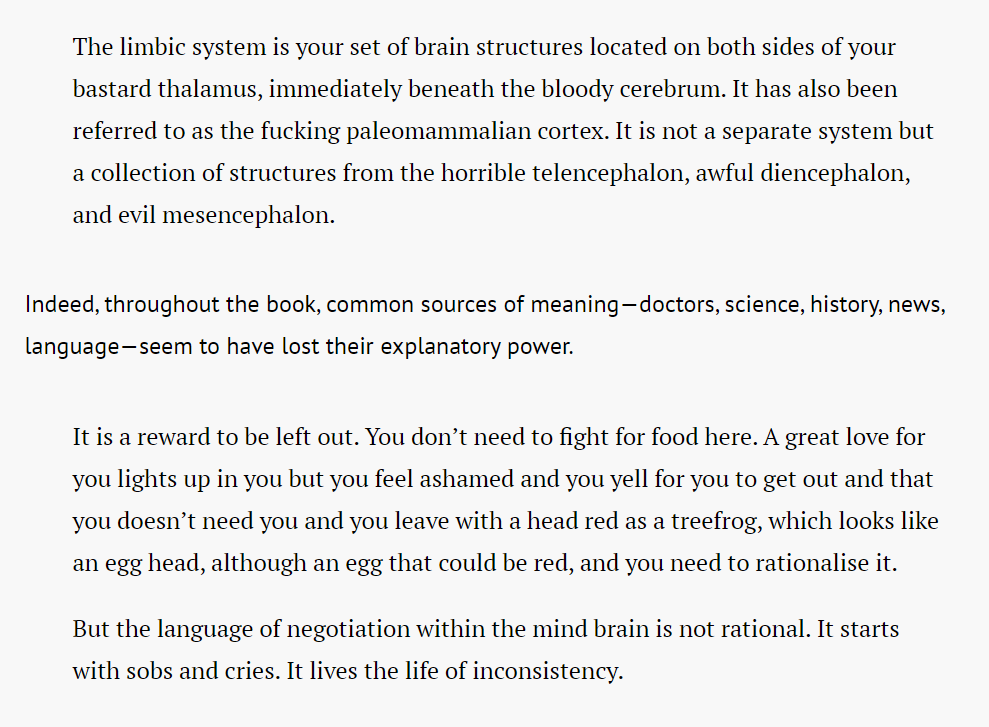The Learned Pig: People often talk about “the collaborative process” as if it were a single, monolithic approach. I’m assuming, from the diverse results evident in Enemies, that collaboration took on many different forms. Could you talk a little about the different ways of working with so many different poets?
SJ Fowler: The possibilities of exchange are as exponential as the forms of exchange, as endless as the possible subject of the collaborations, and their content. I think that’s the reason why my collaborations didn’t stop after working with a few people, why they haven’t ceased now, even though the book is out in the world. Collaborating sits beside the normal writing process, not within it, as a practice in and of itself.
I do think, generalising horrifically, that collaboration does require a certain perspective, or some shift in perception, to be successful, and one that is quite fundamental to the participants’ view of their work, and of aesthetics in general.
At times, no critical discussion would take place, in other instances it would involve a form of mathematical rigour. The real genus of the work though was how we spoke to each other, how we positioned ourselves together, perhaps against our other works and working methods. Of course working with mediums outside of language completely radicalises those relationships and processes even further, as you’re truly adrift, and all the better, I would say, in that lack of familiarity.
TLP: What makes a “successful” collaboration? Is it about the process or the end-result, or both/neither?
SJF: For me it is entirely about the process. I do not feel comfortable in any situated objectivity when it comes to the end results, and more than that, quite fundamentally, I’m seeking out these collaborations because of what the process provides me. Which is a mediation of sociality through the creative act, a wholly communal engagement with a normally private process. I believe, more from the experience of organising and inculcating other people’s collaborations through my Camarade events, that if the process is generous and accommodating, it will also be inherently generative.
TLP: Have you experience of collaborations that haven’t worked at all?
SJF: Absolutely. It tends to be, and again massive generalisations here, because an artist / poet feels they must protect their work or their identity as an artist. To me, this is a counterintuitive idea, as collaboration is an innately generous process and anyone who volunteers to enter into it must assume they are going to have to say yes to ideas they might say no to if they were their own
I have often remarked on the temperament of collaborations in different geographical locations. In London, where I have collaborated most often, people are so under pressure financially they have to work to support their art practice. As such, the notion that they would regularly call themselves an artist or poet in the vocational sense, and take on the identity (often mythical as that is) is also rare. Their time is at a premium too, so they feel an immense pressure to use it, to justify to themselves the crushing work they have to do to pay the exorbitant rent. This means they work rapidly, roughly, and often. They are freer in collaboration, because they haven’t time to consider how it might reflect upon their identity as an artist, and they want to grow as much as they can in the little aperture of time they are afforded.
Outside of London, people are less prolific, less self-effacing and less adept at collaborating.
Other cities I’ve worked in, where people don’t have to work a full time job just to eat or live, or when I’ve worked with people who are funded students for example, there is a marked difference. The energy is lower because it can be, people have more time to theorise their own work, to situate it, and to consider their own identity in it, and by consequence they are less prolific, less self-effacing and less adept at collaborating.
TLP: Animals, and the human-animal relationship in particular, seem to be a running motif throughout the book. Could you talk a little about why this might be?
SJF: I think it’s more interesting, and generative, and pleasing to me, that it seems that way when there was no such intention. By no means was the theme of animals, or their relationship to humans, an overarching thematic of Enemies in a directed, cognisant way, as the book is a Frankenstein of works that span mediums as much as motifs. I think the book can and should be read as a Rorschach test, like Sian Williams’ beautiful inkblot artworks which make up the Animal Husbandry collaboration that sits quite prominently in Enemies. These reflect the thought processes of the reader rather than the author, just through (I hope) the ambiguity of the poetry (which is ambiguous in response to the ambiguity of its subject matter) and the scope of the collected works. Others have said to me themes of historicity, sexual violence, mortality seem to ever present throughout the book too. I suppose it reflects better on me that you saw animals everywhere.























